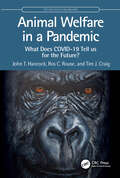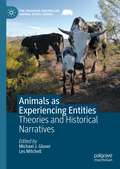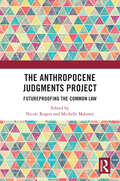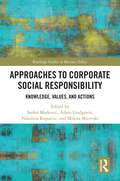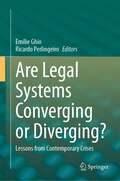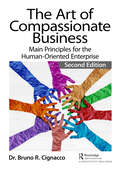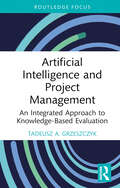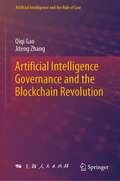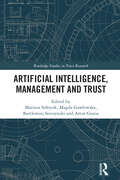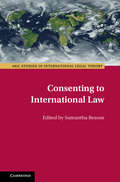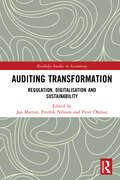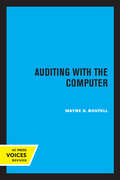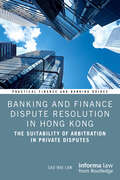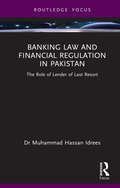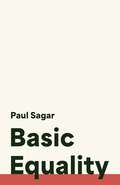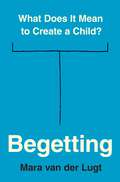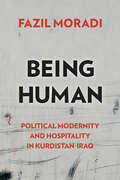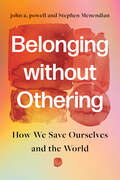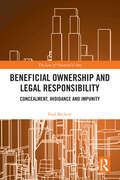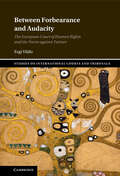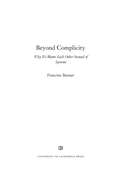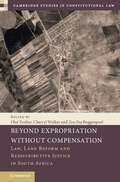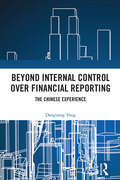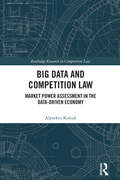- Table View
- List View
Animal Welfare in a Pandemic: What Does COVID-19 Tell us for the Future? (CRC One Health One Welfare)
by John T. Hancock Ros C. Rouse Tim J. CraigAnimal Welfare in a Pandemic explores the impact of COVID-19 on a wide array of animals, from those in the wild to companion and captive animals. During the height of the pandemic, a range of animals were infected, and many died, but this was hard to predict, even using up-to-date bioinformatics. Lockdowns around the world had, and continue to have, a major effect on animals’ welfare, influencing pet ownership and care, as well as impacting on the work of conservation institutes due to the lack of visitors and funding and lack of tourist presence in the wild which impacted on anti-poaching efforts. Some of the vast amount of personal protection equipment (PPE) that was distributed was discarded, creating both dangers and occasional opportunities for wild animals. With the rollout of human vaccines, some countries started developing animal vaccines, only some of which were deployed. In summary, the pandemic had a wide-ranging influence on animal welfare around the world. This is reviewed to highlight what can be learned to protect and enhance animal welfare in future epidemics/pandemics, and contribute to a genuinely One Health approach where the health and welfare of both humans and animals are considered holistically.This book is authored by members of the University of the West of England, Bristol, who span a range of expertise in Biological Sciences, Social Sciences, Animal Welfare, and Ethics.
Animals as Experiencing Entities: Theories and Historical Narratives (The Palgrave Macmillan Animal Ethics Series)
by Michael J. Glover Les MitchellThis volume explores the experiences of those with little or no power—usually, although not exclusively, animals. The theme of animals as experiencing entities is what links the chapters and characterises the volume. Broadly each author in this volume contributes in one of two ways. The first group, in Section 1, theoretically engages animal subjectivity, animal experiences, and ways in which these are to some extent accessible and knowable to humans. The second group of authors, in Section 2, offer narrative accounts about specific animals or groups of animals and explore to some extent their subjective historical experiences. In summary, the first section diversely theorises about animal experiences, while the second section’s authors assume animals’ subjective experiences and construct narratives that take into account how animals might have subjectively experienced historical phenomena.
The Anthropocene Judgments Project: Futureproofing the Common Law
by Nicole Rogers and Michelle MaloneyThis book is a collection of speculative judgments that, along with accompanying commentaries, pursue a novel enquiry into how judges might respond to the formidable and planetary-scaled challenges of the Anthropocene. The book’s contributors –from Australia, Asia, Europe, and the United Kingdom –take up a range of issues: including multispecies justice, the challenges of intergenerational justice, dimensions of postcolonial justice, the potential contribution of AI platforms to the judgment process, and the future of judging and law in and beyond the Anthropocene. The project takes its inspiration from existing critical judgment projects. It is, however, thoroughly interdisciplinary. In anticipating future scenarios, and designing or adapting legal principles to respond to them, the book’s contributors have been assisted by climate scientists with expertise in future modelling; they have benefitted from the experience of fiction writers in future worldbuilding; and they have incorporated elements of the future worlds depicted in various texts of speculative fiction and artworks. The judgments are, of necessity, speculative and hypothetical in their subject matter. Thus, taken together, they constitute a collaborative experiment in creating the inclusive and radical imaginaries of the future common law. The Anthropocene Judgments Project will appeal to critical and sociolegal academics, scholars in the environmental humanities, environmental lawyers, students, and others with interests in the pressing issues of ecology, multispecies justice, climate change, the intersection of AI platforms and the law, and the future of law in the Anthropocene.
Approaches to Corporate Social Responsibility: Knowledge, Values, and Actions (Routledge Studies in Business Ethics)
by Stefan Markovic Adam Lindgreen Nikolina Koporcic Milena MicevskiFollowing recent growth of ethical consumerism, customers and other stakeholders increasingly pressure organizations to be socially responsible and minimize their negative impact on the environment. Accordingly, a plethora of firms have integrated corporate social responsibility (CSR) at the center of their business strategies and actions. Whilst this has resulted in many firms meeting their broader responsibilities toward society and the environment, some firms have used CSR in a manipulative and insincere way. As stakeholders become aware of such misuse of CSR, largely thanks to the rapid evolution of information technologies, they start to penalize firms by spreading negative word of mouth about them, and specifically about their CSR knowledge, values, and actions. Now, more than ever before, stakeholders are increasingly critical and cautious in their assessments of firms’ CSR knowledge, values, and actions. On this background, this edited volume sheds light on different internal and external perspectives spanning CSR knowledge, values, and actions. It shares theoretical, practical, and case-based insights on the broader topic and can be of interest to researchers, academics, practitioners, and advanced students in the fields of CSR and business ethics, knowledge management, strategy, and marketing.
Are Legal Systems Converging or Diverging?: Lessons from Contemporary Crises
by Emilie Ghio Ricardo PerlingeiroThis book focuses on two main aspects: legal convergence and crises. Despite the abundance of literature on legal convergence over the years, the question of whether legal systems are converging or diverging remains unanswered. This book provides a valuable contribution to questions concerning comparative law, legal convergence, and legal transplants by examining them through the lens of crises.Crises challenge countries’ legal systems and prompt institutional responses to tackle perceived shortcomings in the law. The crises witnessed by the world over the last two decades have highlighted two seemingly contradictory tendencies:(i) increased cooperation and a natural phenomenon of legal convergence as states find common solutions to common problems;(ii) a preference for state-centric solutions, which prioritise domestic interests; rejection of supranational standards and harmonisation efforts; and protection of domestic sovereignty.This book aims to determine whether, in times of crisis, foreign laws, rules, and concepts can transcend countries’ domestic legal systems, or whether states’ responses to crises lead to legal divergence and disintegration.Unlike traditional studies on convergence, this edited volume takes an international and cross-thematic approach, with chapters focusing on how legislation in selected jurisdictions has responded to crises. Therefore, the book’s originality lies in its truly global nature, with chapters and authors surveying jurisdictions in Africa, North and South America, Asia, Europe and Oceania. The breadth of legal areas covered, with a mix of private and public law, also add to its uniqueness.From Russia to Germany and from bankruptcy law to environmental law, the book examines whether, as a result of crises, policy and legal responses have adopted, copied, or implemented features, policies, principles and/or rules from other legal systems (convergence), or have departed from existing legal norms, adopting policies and rules that differ from those of other countries (divergence).
The Arsenic Eater's Wife: A brand new dark historical mystery that will keep you guessing
by Tonya MitchellA woman is accused of killing her husband, but is she actually guilty? Inspired by a true historical case, this novel will delight and engross readers. Liverpool, England, 1889: In the shadowy streets, the air is thick with secrets and the line between guilt and innocence blurs. Twenty-six-year-old Constance Sullivan is brought to trial charged with poisoning her husband, William. But William was no ordinary victim… As Constance's barrister fights to prove her innocence, a sinister web of deception unravels, exposing the dark underbelly of their seemingly idyllic marriage. One by one, witnesses emerge with incriminating testimony and facts about the dark side of Constance and William&’s marriage are revealed. For many, the widow&’s guilt seems clear. But is someone holding the key to the whole truth? Inspired by a true case, The Arsenic Eater&’s Wife will hold the reader spellbound until the final, heart-stopping revelation.Praise for Tonya Mitchell&’s A Feigned Madness &“A compelling read for anyone with an interest in Victorian history.&” —Pam Lecky, author of the Lucy Lawrence mysteries &“Vivid, enthralling . . . a knockout.&” —Kim Taylor Blakemore, author of After Alice Fell
The Art of Compassionate Business: Main Principles for the Human-Oriented Enterprise
by Bruno R. CignaccoThere are several well-ingrained assumptions regarding the dynamics of work and business activities, which can be refuted. Some examples of these widespread assumptions in business and work environments are employees being viewed as commodities, competitors perceived as threats, companies’ resources seen as limited, and customers perceived as scarce and difficult. All this leads to the question: "Is there a way to perform business activities more humanely?" The second edition of this book challenges the reader to change the way they perform in business situations and become more focused on the human aspects of business activities. The users of this knowledge and those affected by them will undergo a profound transformation in the way they perform business activities. They will benefit from gradually testing and implementing the guidelines conveyed in this book, both in the business environment and in the workplace. When readers put these principles into practice, positive ripple effects are bound to affect other stakeholders of the organisation they work for or own. The author has refreshed all the concepts and examples introduced in the first edition which include aspects related to mission and vision, passion, business mindset, organisational learning, improvement of business conversations, use of constructive criticism, and betterment of relationships with the most relevant stakeholders (customers, suppliers, intermediaries, community, employees, etc.). The author also includes a discussion of creativity and the innovation process as well as other relevant aspects related to a healthy business environment and provides various real-life examples of companies which have adopted a loving attitude towards their stakeholders – which has become so important in the current business environment.
Artificial Intelligence and Project Management: An Integrated Approach to Knowledge-Based Evaluation (ISSN)
by Tadeusz A. GrzeszczykAlthough some people had doubts about the usefulness of such solutions in the past, artificial intelligence (AI) plays a growing role in modern business. It can be expected that the interest in it will also lead to an increase in support for the planning, evaluation, and implementation of projects. In particular, the proper functioning of multifaceted evaluation methods has a crucial impact on the appropriate planning and execution of various projects, as well as the effective achievement of the organization’s goals. This book offers a presentation of the complex problems and challenges related to the development of AI in project management, proposes an integrated approach to knowledge-based evaluation, and indicates the possibilities of improving professional practical knowledge in this field.The unique contribution of this book is to draw attention to the possibilities resulting from conducting transdisciplinary research and drawing on the rich achievements in the field of research development on knowledge-based systems that can be used to holistically support the processes of planning, evaluation, and project management. The concept of the integrated approach to knowledge-based evaluation is presented and developed as a result of drawing inspiration mainly from the systems approach, generative AI, and selected mathematical models.Presented in a highly accessible manner, the book discusses mathematical tools in a simple way, which enables understanding of the content by readers across broad subject areas who may be not only participants in specialist training and university students but also practitioners, consultants, or evaluators. This book will be a valuable resource for academics and upper-level students, in particular, across project management-related fields, and of great interest to all those looking to understand the challenges and effectiveness of AI in business.
Artificial Intelligence Governance and the Blockchain Revolution (Artificial Intelligence and the Rule of Law)
by Qiqi Gao Jiteng ZhangThis is the first professional academic work in China to discuss artificial intelligence and blockchain together. Artificial intelligence is a productivity revolution, and its development has a significant and profound impact on global changes. However, at the same time, its development also brings a series of challenges to human society, such as privacy, security, and fairness issues. Therefore, the significance of blockchain is even more prominent. Blockchain is a revolution in production relations, which will propose important solutions to the challenges of privacy, security, and fairness that arise after the development of artificial intelligence. The book not only discusses the problems currently faced by the development of artificial intelligence, as well as the new opportunities and challenges that artificial intelligence brings to future global governance, but also explains the further development direction of the intelligent revolution from the perspective of blockchain.
Artificial Intelligence, Management and Trust (Routledge Studies in Trust Research)
by Mariusz Sołtysik Magda Gawłowska Bartlomiej Sniezynski Artur GuniaThe main challenge related to the development of artificial intelligence (AI) is to establish harmonious human-AI relations, necessary for the proper use of its potential. AI will eventually transform many businesses and industries; its pace of development is influenced by the lack of trust on the part of society. AI autonomous decision-making is still in its infancy, but use cases are evolving at an ever-faster pace. Over time, AI will be responsible for making more decisions, and those decisions will be of greater importance. The monograph aims to comprehensively describe AI technology in three aspects: organizational, psychological, and technological in the context of the increasingly bold use of this technology in management. Recognizing the differences between trust in people and AI agents and identifying the key psychological factors that determine the development of trust in AI is crucial for the development of modern Industry 4.0 organizations. So far, little is known about trust in human-AI relationships and almost nothing about the psychological mechanisms involved. The monograph will contribute to a better understanding of how trust is built between people and AI agents, what makes AI agents trustworthy, and how their morality is assessed. It will therefore be of interest to researchers, academics, practitioners, and advanced students with an interest in trust research, management of technology and innovation, and organizational management.
ASIL Studies in International Legal Theory: Consenting to International Law (Asil Studies In International Legal Theory Ser.)
by Samantha Besson Louis HillAuditing Transformation: Regulation, Digitalisation and Sustainability (Routledge Studies in Accounting)
by Jan Marton Fredrik Nilsson Peter ÖhmanThis book identifies drivers of transformation of auditing, including regulation, digitalisation, sustainability, and individual auditor characteristics, and discusses how the drivers affect auditing. It provides a holistic perspective, discussing these current and highly relevant themes in depth and ‘one by one’ and also stresses the importance of the temporal dimension, i.e., offering a historical and a present-day perspective. The book covers several different theoretical perspectives when analysing and discussing how the various drivers affect auditors, the audit process, accounting firms, stakeholders and so on. Sweden is used as a setting to study the effects of these drivers of transition. The Swedish experience is generalisable to other European countries, with a Germanic origin currently influenced by Anglo-American ideas of auditing. In addition, Sweden provides a research setting with unique access to empirical data. The monograph is unique in its broad coverage of drivers of transformation, combined with its clear focus on financial auditing. It is informed by a wide range of research approaches, from qualitative interview studies to recently developed machine learning methods. Readers, therefore, benefit from a comprehensive understanding of current changes in the audit industry. This will be a useful reference work for students of accounting and auditing, as well as for audit practitioners, including both auditors and regulators, and for researchers.
Auditing with the Computer
by Wayne S. BoutellThis title is part of UC Press's Voices Revived program, which commemorates University of California Press’s mission to seek out and cultivate the brightest minds and give them voice, reach, and impact. Drawing on a backlist dating to 1893, Voices Revived makes high-quality, peer-reviewed scholarship accessible once again using print-on-demand technology. This title was originally published in 1965.
Banking and Finance Dispute Resolution in Hong Kong: The Suitability of Arbitration in Private Disputes (Practical Finance and Banking Guides)
by Sau Wai LawThis book examines the concept of ‘naming, blaming, claiming’ in the application of arbitration for private banking dispute resolution. The author focuses on examining this issue using Hong Kong as a case in point, blending theory and empirical evidence to unveil how disputes are resolved within the banking and finance industry, which will enable them to explore possible effective and efficient mechanisms to resolve financial disputes. The book offers a comprehensive review of the laws and regulations governing the private banking industry in Hong Kong and selected jurisdictions, as well as how they are implemented. It examines the clients’ perceptions through an innovative methodology for empirical studies. Describing how clients react to the laws and regulations and the potential adverse impacts to the stability of the banking industry, the author identifies possible factors that could trigger another financial crisis. Synthesising his analysis, the author proposes newly discovered self-corrective mechanisms embedded among clients and concludes with policy recommendations. Directly relevant to banking practitioners, particularly legal and compliance departments, and senior management, the book is also written for legal professionals interested in the practices of dispute resolution in banking and finance. Additional readerships will include bank regulators, government officials, policy makers, researchers, and those involved in courses in banking and financial law, as well as Arbitration and Dispute Resolution.
Banking Law and Financial Regulation in Pakistan: The Role of Lender of Last Resort
by Muhammad Hassan IdreesThis book offers an analysis of the contemporary significance of the practice of Lender of Last Resort (LOLR) in Pakistan. Aiming to identify deficiencies in current financial system legislation, the book details the role of LOLR and its essential presence in establishing a resilient banking and financial system.Beginning with an assessment of the emergence of Central Banks as domestic financial regulators, the book draws from the principles of Walter Bagehot and Henry Thornton for LOLR rescue operations. Examining the International Monetary Fund’s (IMF) role as an international lender of last resort and scrutinising its rescue efforts, the book uses case studies of the Central Banks in the United Kingdom and the United States to suggest reforms for Pakistan’s system. It explores the causes of financial crises and evaluates the factors that have made LOLR an integral part of Central Banks’ responsibilities. It compares LOLR operations in the cases of AIG and Lehman Brothers in the United States and Northern Rock in the United Kingdom, comparing these two cases in Pakistan to pinpoint key gaps in the State Bank of Pakistan’s LOLR operations. Furthermore, it discusses the Basel Accord I, II, and III: the key international regulations for the banking sector.The book will be of interest to scholars and students in the field of financial and banking law.
Basic Equality
by Paul SagarAn innovative argument that vindicates our normative commitment to basic equality, synthesising philosophy, history, and psychologyWhat makes human beings one another&’s equals? That we are "basic equals" has become a bedrock assumption in Western moral and political philosophy. And yet establishing why we ought to believe this claim has proved fiendishly difficult, floundering in the face of the many inequalities that characterise the human condition. In this provocative work, Paul Sagar offers a novel approach to explaining and justifying basic equality. Rather than attempting to find an independent foundation for basic equality, he argues, we should instead come to see our commitment to this idea as the result of the practice of treating others as equals. Moreover, he continues, it is not enough to grapple with the problem through philosophy alone—by just thinking very hard, in our armchairs; we must draw insights from history and psychology as well.Sagar writes that, as things stand, there appear to be no good arguments for believing in the truth of basic equality. Indeed, for much of Western intellectual history and social practice, basic inequality has been the default position. How is it then, Sagar asks, that in Western societies, in a period of less than a century, basic equality emerged as the dominant view? Sagar approaches this not as a mere philosophical puzzle, but as a dramatic historical development. In so doing, he shows us what is at stake when human beings treat one another as equals just because they are human beings.
Begetting: What Does It Mean to Create a Child?
by Mara van der LugtAn investigation of what it means to have children—morally, philosophically and emotionally&“Do you want to have children?&” is a question we routinely ask each other. But what does it mean to create a child? Is this decision always justified? Does anyone really have the moral right to create another person? In Begetting, Mara van der Lugt attempts to fill in the moral background of procreation. Drawing on both philosophy and popular culture, van der Lugt does not provide a definitive answer on the morality of having a child; instead, she helps us find the right questions to ask.Most of the time, when we talk about whether to have children, what we are really talking about is whether we want to have children. Van der Lugt shows why this is not enough. To consider having children, she argues, is to interrogate our own responsibility and commitments, morally and philosophically and also personally. What does it mean to bring a new creature into the world, to decide to perform an act of creation? What does it mean to make the decision that life is worth living on behalf of a person who cannot be consulted? These questions are part of a conversation we should have started long ago. Van der Lugt does not ignore the problematic aspects of procreation—ethical, environmental and otherwise. But she also acknowledges the depth and complexity of the intensely human desire to have a child of our own blood and our own making.
Being Human: Political Modernity and Hospitality in Kurdistan-Iraq (Genocide, Political Violence, Human Rights)
by Fazil MoradiThe Iraqi Baʿth state’s Anfāl operations (1987-1991) is one of the twentieth century’s ultimate acts of destruction of the possibility of being human. It remains the first and only crime of state in the Middle East to be tried under the 1948 UN Genocide Convention, the 1950 Nuremberg Principles, and the 1969 Iraqi Penal Code and to be recognized as genocide, crimes against humanity, and war crimes in Baghdad between 2006 and 2007. Being Human: Political Modernity and Hospitality in Kurdistan-Iraq offers an unprecedented pathway to the study of political violence. It is a sweeping work of anthropological hospitality, returning to the Anfāl operations as the violence of political modernity only to turn to the human survivors’ hospitality and acts of translation—testimonial narratives, law, politics, archive, poetry, artworks, museums, memorials, symbolic cemeteries, and infinite pursuit of justice in the Kurdistan Region of Iraq. Being Human gathers together social sciences, humanities, and the arts to understand modernity's violence and its living on.
Belonging without Othering: How We Save Ourselves and the World
by john a. powell Stephen MenendianThe root of all inequality is the process of othering – and its solution is the practice of belonging We all yearn for connection and community, but we live in a time when calls for further division along the well-wrought lines of religion, race, ethnicity, caste, and sexuality are pervasive. This ubiquitous yet elusive problem feeds on fears – created, inherited – of the "other." While the much-touted diversity, equity, and inclusion initiatives are undeniably failing, and activists narrowly focus on specific and sometimes conflicting communities, Belonging without Othering prescribes a new approach that encourages us to turn toward one another in unprecedented and radical ways. The pressures that separate us have a common root: our tendency to cast people and groups in irreconcilable terms – or the process of "othering." This book gives vital language to this universal problem, unveiling its machinery at work across time and around the world. To subvert it, john a. powell and Stephen Menendian make a powerful and sweeping case for adopting a paradigm of belonging that does not require the creation of an "other." This new paradigm hinges on transitioning from narrow to expansive identities – even if that means challenging seemingly benevolent forms of community-building based on othering. As the threat of authoritarianism grows across the globe, this book makes the case that belonging without othering is the necessary, but not the inevitable, next step in our long journey toward creating truly equitable and thriving societies. The authors argue that we must build institutions, cultivate practices, and orient ourselves toward a shared future, not only to heal ourselves, but perhaps to save our planet as well. Brimming with clear guidance, sparkling insights, and specific examples and practices, Belonging without Othering is a future-oriented exploration that ushers us in a more hopeful direction.
Beneficial Ownership and Legal Responsibility: Concealment, Avoidance and Impunity (The Law of Financial Crime)
by Paul BeckettThis book explores the connection between ownership, on one hand, and immunity from legal responsibility, on the other. It presents a definition of the concept of beneficial ownership, the reasons for its concealment, and failures in international legal structures and arrangements. Globally, States confront complex criminality, such as corruption, tax evasion, doctrinal fanaticism, trafficked slaves, terrorism and, war. At the personal level, men and women may seek to escape their creditors, to disinherit unwanted heirs, to cheat divorced partners, and to appear straightforward when this is not the case. The response of politicians and regulators has been a global State initiative to identify beneficial owners via public registers to promote transparency and accountability. Yet, at the same time, there is an equally powerful global and personal counter-initiative to promote beneficial ownership avoidance. Where there is no owner, there is no accountability. This book examines what “ownership” means in legal terms across multiple legal systems and explains why singling out “ownership” as being pivotal to State and personal accountability is a strategy both flawed and disingenuous. It is argued that an apparent lack of political will coupled with shape-shifting definitions of “ownership” have resulted in tokenism. Particular attention is paid to those “orphan” structures which have evolved from standard models, or which have been designed for the purpose in each case of facilitating ownership concealment and avoidance. The author explains how the virtual world of the blockchain, crypto-assets and cryptocurrency, and virtual entities such as the Decentralised Autonomous Organisation (DAO), all of which elude legal classification, have opened a new world of possibilities. Applicable across all jurisdictions and legal systems, the book will be a valuable resource for academics, researchers, and policy-makers working in the areas of Financial Crime, Regulation, Compliance, Business, and Accountancy.
Between Forbearance and Audacity: The European Court of Human Rights and the Norm against Torture (Studies on International Courts and Tribunals)
by Ezgi YildizWhen international courts are given sweeping powers, why would they ever refuse to use them? The book explains how and when courts employ strategies for institutional survival and resilience: forbearance and audacity, which help them adjust their sovereignty costs to pre-empt and mitigate backlash and political pushback. By systematically analysing almost 2,300 judgements from the European Court of Human Rights from 1967–2016, Ezgi Yildiz traces how these strategies shaped the norm against torture and inhumane or degrading treatment. With expert interviews and a nuanced combination of social science and legal methods, Yildiz innovatively demonstrates what the norm entails, and when and how its contents changed over time. Exploring issues central to public international law and international relations, this interdisciplinary study makes a timely intervention in the debate on international courts, international norms, and legal change. This book is available as Open Access on Cambridge Core.
Beyond Complicity: Why We Blame Each Other Instead of Systems
by Francine BannerAn ambitious study of our obsession with complicity that shows how we can all become "good accomplices." Beyond Complicity is a fascinating cultural diagnosis that identifies our obsession with complicity as a symptom of a deeply divided society. The questions surrounding what it means to be legally complicit are the same ones we may ask ourselves as we evaluate our own and others' responsibility for inherited and ongoing harms, such as racism, sexism, and climate change: What does it mean that someone "knew" they were contributing to wrongdoing? How much involvement must a person have in order to be complicit? At what point are we obligated to intervene? Francine Banner ties together pop culture, politics, law, and social movements to provide a framework for thinking about what we know intuitively: that our society is defined by crisis, risk, and the quest to root out hazards at all costs. Engaging with legal cases, historical examples, and contemporary case studies, Beyond Complicity unfolds the complex role that complicity plays in US law and society today, offering suggestions for how to shift focus away from blame and toward positive, lasting systemic change.
Beyond Expropriation Without Compensation: Law, Land Reform and Redistributive Justice in South Africa (Cambridge Studies in Constitutional Law)
by Olaf Zenker Cherryl Walker Zsa-Zsa BoggenpoelSpeeding up land reform through a constitutional amendment that would explicitly permit the expropriation of land without compensation has dominated legal and political-policy debates in South Africa in recent years. Taking this politically and emotionally charged issue as its starting point, this volume offers both expert commentary on this issue from a variety of disciplinary perspectives and also fresh ideas on how to advance the redistributive transformation that South Africa so urgently needs. It brings critically important debates around transformative property law, the need for diversified land justice and the possibilities of alternative forms of redistribution into productive conversation with each other. While grounded in the complex realities of South Africa's past and present, the volume speaks to concerns that resonate in many contexts in the Global South and beyond. It will appeal to scholars, students, policymakers and general readers concerned with both the theory and practice of redistributive justice. This title is also available as Open Access on Cambridge Core.
Beyond Internal Control over Financial Reporting: The Chinese Experience
by Daoguang YangBy examining two different modes of internal control and the fundamentals of risk management, this book analyses the role of internal control in financing, investment, profit distribution, and corporate strategies through China's experience. In doing so, it confirms the effectiveness and superiority of internal control over operation and management. The book compares the various internal control methods used in China and the USA, namely, operation and management-oriented versus financial reporting-oriented approaches. It also discusses the differences in corporate risk attitudes and behaviours under the two approaches. The author then proposes the hyper-correction hypothesis and the trimming hypothesis. Empirical findings regarding corporate cash policy, mergers and acquisitions, tax avoidance, and diversification strategy reveal that internal control in China does not result in undue risk aversion but instead manages enterprise risk within a reasonable capacity. These results support the trimming hypothesis and demonstrate that internal control is a useful risk management tool. The title will appeal to students, academics, and accounting professionals interested in internal control (risk management), accounting, auditing and corporate finance, regulation and governance.
Big Data and Competition Law: Market Power Assessment in the Data-Driven Economy (Routledge Research in Competition Law)
by Alptekin KoksalRecent studies on competition law and digital markets reveal that accumulating personal information through data collection and acquisition methods benefits consumers considerably. Free of charge, fast and personalised services and products are offered to consumers online. Collected data is now an indispensable part of online businesses to the point that a new economy, a data-driven sector, has emerged. Many markets such as the social network, search engine, online advertising and e-commerce are regarded as data-driven markets in which the utilisation of Big Data is a requisite for the success of operations. However, the accumulation and use of data brings competition law concerns as they contribute to market power in the online world, resulting in a few technology giants gaining unprecedented market power due to the Big Data accumulation, indirect network effects and the creation of online ecosystems. As technology giants have billions of consumers worldwide, data-driven markets are truly global. In these data-driven markets, technology giants abuse their dominant positions, but existing competition law tools seem ineffective in addressing market power and assessing abusive behaviour related to Big Data. This book argues that a novel approach to the data-driven sector must be developed through the application of competition law rules to address this. It argues that current and potential conflicts can be mitigated by extending the competition law assessment beyond the current competition law tools to offer a modernised and unified approach to the Big Data–related competition issues. Promoting new legal tests for addressing the market power of technology giants and assessing abusive behaviour in data-driven markets, this book advocates for cooperation between competition and data protection authorities. It will be of interest to students, academics and practitioners with an interest in competition law and data protection.
